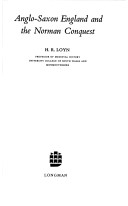Social and Economic History of England
1 total work
This book gives an account of the social and economic developments in Anglo-Saxon England from the first settlements in the fifth and sixth centuries to the immediate aftermath of the Norman conquest. The basic structure of analysis rests on the surviving legal and literary evidence, buttressed by the latest findings of archaeologists, numismatists, and art historians. In nearly 30 years since the first edition there has been great advance in knowledge, notably on the numismatic side, but the main themes remain constant and deal with a steady development from tribal institutions where the social power of the kindred is dominant towards the creation of a territorial kingdom where the chief bonds that keep a community together concern lordship in all its attributes. The part that kingship and the Christian church played in legitimizing an ordered society, notably in the last century and a half of Anglo-Saxon England, is properly emphasized.
Attention is paid also to much recent work on themes such as the nature of the earliest political groupings, the implications of the Sutton Hoo burial site, the possibility of a mid-Saxon settlement shift, the wider consequences of the tenth-century reformation, and the nature and purpose of Domesday Book. Throughout full weight is placed on the European context within which English developments played a special role, deeply similar in many respects to Carolingian Frankie or Ottonian Germany but with a peculiar insular flavour of their own.
Attention is paid also to much recent work on themes such as the nature of the earliest political groupings, the implications of the Sutton Hoo burial site, the possibility of a mid-Saxon settlement shift, the wider consequences of the tenth-century reformation, and the nature and purpose of Domesday Book. Throughout full weight is placed on the European context within which English developments played a special role, deeply similar in many respects to Carolingian Frankie or Ottonian Germany but with a peculiar insular flavour of their own.
